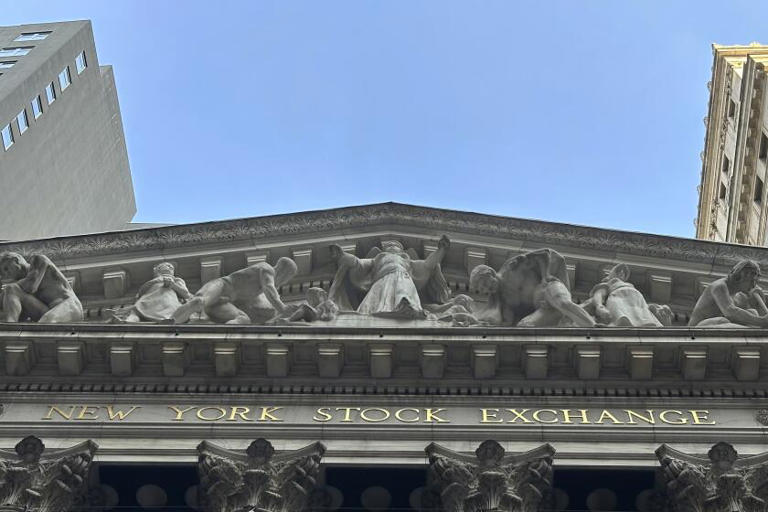On Wednesday, U.S. stock indexes experienced a dramatic sell-off, marking their most significant declines since 2022. This market downturn was primarily triggered by underwhelming profit reports from Tesla and Alphabet, which dampened the enthusiasm around artificial intelligence technology that had recently fueled Wall Street’s optimism.
The Standard & Poor’s 500 Index dropped 2.3%, registering its fifth loss in the past six trading sessions. Meanwhile, the Dow Jones Industrial Average plummeted by 504 points, or 1.2%, and the Nasdaq Composite took the hardest hit, sliding 3.6%. These declines underscore how critical earnings reports from major tech companies have become in sustaining market momentum.
Sam Stovall, chief investment strategist at CFRA, pointed out that while the profit reports from Tesla and Alphabet were not disastrous, they nevertheless raised investor concerns about the possibility of other significant companies also falling short of expectations. “How many disappointments are we likely to see? Maybe let’s sell first and ask questions later,” Stovall commented, reflecting a cautious sentiment among investors.
Tesla’s stock was particularly affected, tumbling 12.3% after the company reported a 45% drop in quarterly profits, which missed analysts’ forecasts. Tesla, one of Wall Street’s most valuable companies, owes much of its high valuation not just to its electric vehicles but also to its ambitious AI initiatives, such as its robotaxi project. However, UBS analysts, led by Joseph Spak, noted that assigning a value to these AI projects is challenging due to unclear timelines and uncertain probabilities of success.
Alphabet also faced investor skepticism. Despite delivering better-than-expected profit and revenue for the latest quarter, its stock fell 5%. Analysts highlighted some underlying weaknesses, including slower growth in YouTube advertising revenue than anticipated. Additionally, concerns were raised about the impact of increased AI investments and other expenditures on the company’s cash generation. The larger issue for Alphabet might have been the high expectations set by its nearly 50% stock rally over the past year, driven by anticipated continuous growth.
The “Magnificent Seven” stocks—Alphabet, Amazon, Apple, Meta Platforms, Microsoft, Nvidia, and Tesla—have been carrying high profit expectations. These companies have been the primary drivers of the S&P 500’s rise to record levels this year, even as many other stocks struggled under the burden of high interest rates. Critics argue that these superstar stocks are now overvalued after their substantial gains, making them vulnerable to any sign of slowing growth.
Wall Street is hopeful that if the momentum for the Magnificent Seven wanes, other stocks might rise to support the market. This optimism has been partly fueled by the recent improvement in conditions for smaller stocks. These stocks have seen a boost from expectations of imminent interest rate cuts by the Federal Reserve. The Russell 2000 index of smaller stocks had been performing well, gaining at least 1% in seven of the last ten days, although it also dropped 2.1% on Wednesday.
The smaller stocks’ recent gains were driven by easing Treasury yields, based on expectations that inflation is slowing enough for the Federal Reserve to begin lowering its main interest rate. Preliminary data on Wednesday suggested a mixed economic outlook: while U.S. business activity in manufacturing was contracting, the services sector continued to grow. This scenario, often referred to as a “Goldilocks” economy, is neither too hot to drive up inflation nor too cold to tip into a recession.
In the bond market, Treasury yields were mixed. The yield on the 10-year Treasury rose slightly to 4.28% from 4.25% the previous day. This rise reflects ongoing uncertainty in economic conditions and market sentiment.
Among individual stocks, AT&T was a bright spot, rising 5.2% after its quarterly profit matched analysts’ expectations. Mattel also saw a significant gain of 9.8%, driven by strong performance in its Fisher-Price and Hot Wheels lines.
However, the broader market challenge remains that other stocks need to rise substantially to offset declines in Big Tech. For instance, Nvidia fell 6.8%, which, despite being less severe than Tesla’s drop, was the heaviest weight on the S&P 500 due to Nvidia’s large market value. A 1% move in Nvidia’s stock has a more significant impact on the index than any company other than Microsoft or Apple.
Outside of Big Tech, other notable movements included Lamb Weston, which suffered the worst loss in the S&P 500, plunging 28.2%. The company reported weaker-than-expected profits due to fewer diners visiting restaurants and warned of ongoing challenges in the upcoming fiscal year due to “menu price inflation.”
Overall, the S&P 500 fell by 128.61 points to 5,427.13, the Dow dropped by 504.22 points to 39,853.87, and the Nasdaq slid by 654.94 points to 17,342.41. The downturn wasn’t confined to the U.S.; stock markets across Europe and Asia also slumped. In France, the CAC 40 index fell 1.1%, with shares of luxury giant LVMH dropping 4.7% after its quarterly sales missed expectations.
This broad-based decline highlights the market’s current volatility and the critical role of major tech companies in influencing overall market sentiment. As investors continue to navigate through earnings season, the performance of these tech giants will likely remain a focal point for market direction.
